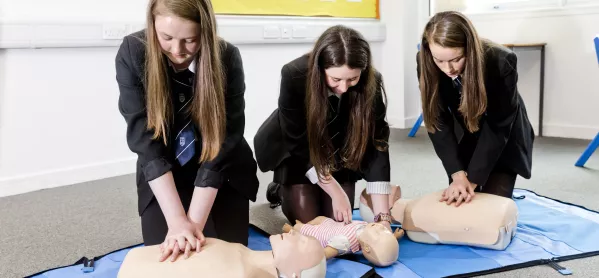Teaching CPR in every secondary school could triple the cardiac-arrest survival rate, a charity has said.
The British Heart Foundation Scotland said that training all secondary school pupils in CPR (cardiopulmonary resuscitation) had the potential to save thousands of lives.
The charity made the call at a fringe meeting of the SNP conference in Glasgow today, a day after the party backed a motion for schools to teach CPR to all pupils.
Some 10 of Scotland’s 32 local authorities have committed to CPR training in schools, but today’s meeting heard that Scotland has the lowest survival rate in the UK for out-of-hospital cardiac arrest.
Dr Andrew Lockey, honorary secretary of the Resuscitation Council (UK), said at the meeting that survival rates “rocketed” in Denmark after CPR was introduced into its curriculum in 2005.
He added that it was a “phenomenally empowering” skill which, even when used on someone who did not ultimately survive, gave families reassurance that “everything was done which could be done”.
Free CPR training kits
CPR is being added to the national curriculum in England, but Dr Lockey stressed that this “does not mean every child will be taught”.
“I look enviously to Scotland,” he said, adding that the growing support of local authorities there was encouraging. “Local ownership with a national mandate is a great way forward,” he explained.
The British Heart Foundation Scotland is offering free training kits to schools that decide to offer CPR, and says it will take only 30 minutes to teach the essential skills to pupils.
One council which has taken up the offer is Renfrewshire - including schools such as Park Mains High in Erskine (pictured) - and its education convener, Jim Paterson, said he believed that “by this time next year all secondary pupils [in Scotland] will be trained in CPR”.
Yesterday’s motion warned that “Scotland seriously lags behind comparable countries in cardiac-arrest survival rates”, adding that “all pupils across Scotland would benefit from learning this proven lifesaving skill, creating a generation of lifesavers”.
The motion’s proposer, delegate Alexander Anderson, said: “Cardiac arrests are the most common life-threatening emergency. Your chance of survival decrease by 10 per cent for every minute you don’t get CPR.
“Where training is provided in schools, there is a positive impact on survival rates.”
In a 2016 Tes survey of 2,500 secondary students, on the things you should do before leaving school, learning how to perform CPR was ranked 19th in a list of 100.
In May, the Scottish Parliament heard that a defibrillator should be installed in every school in the country.
The proposal could save lives, MSPs heard, yet the machines - which give a high-energy electric shock to the heart to someone who is in cardiac arrest - were not yet on the premises of many schools.
MSPs heard during May’s debate that campaigners for more defibrillators in communities had found some councils seemingly unwilling for them to be put in public buildings, including schools.




